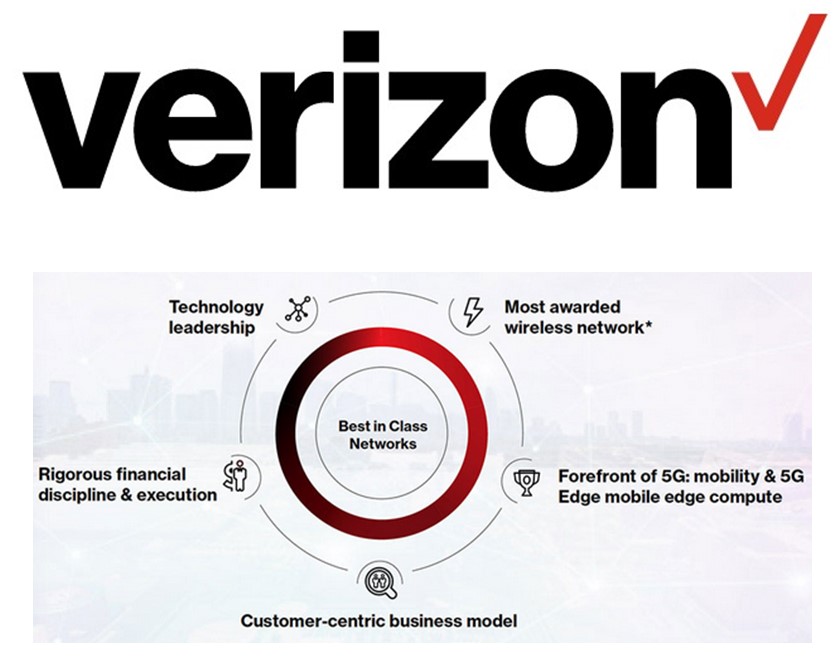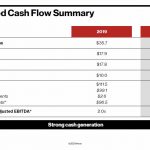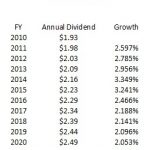Contents
Verizon Communications Inc. (VZ) is a holding company that, acting through its subsidiaries, is one of the world’s leading providers of communications, information and entertainment products and services to consumers, businesses and government entities. With a presence globally, VZ offers voice, data and video services and solutions on its networks that are designed to meet customers’ demand for mobility, reliable network connectivity, security and control.
VZ's operating structure focuses on three customer-facing areas: Consumer, Business and Media. It serves customers in over 150 countries and also serves 99% of Fortune 500 customers.
Summary
- Verizon Communications Inc. (VZ) is one of the world’s leading providers of technology, communications, information and entertainment products and services.
- The Telecom Services industry, being highly capital intensive, has extremely high barriers to entry.
- The future of industry participants rests heavily on the outcome of the awarding of valuable airwave licenses that can be used to build out faster and more powerful 5G networks. The outcome of the recent auction is expected to be announced shortly by the FCC.
- Although VZ's attractive dividend yield appeals to some investors, the compound annual growth rate of the dividend over the past 10 years is just slightly above 2%.
- Investors may wish to approach an investment in VZ from the perspective of where VZ may be in a few years time as opposed to VZ being similar to its past.
Introduction
Investors looking at an investment in Verizon Communications Inc. (VZ) by merely at its historical performance would be wise to consider the extent to which the company is being reinvented to provide services as opposed to infrastructure.
On August 15, 2016 I initiated a 500 share position in VZ in one of the 'Core' accounts within the FFJ Portfolio. As I look back on this investment I see that I could have deployed funds invested in VZ to generate a far superior return. When I initiated a VZ position, however, my primary consideration to invest in a reasonably safe company which would generate a reliable stream of dividend income; I had retired less than 3 months prior to making this investment.
It turns out I have not required my VZ dividend income and now I find myself holding 580 shares by merely having automatically reinvested the quarterly dividends after the 15% withholding tax was deducted; shares are held in a taxable account.
Now I find out that Berkshire Hathaway (BRK-a and BRK-b) acquired in excess of 146.7 million shares a couple of quarters ago; BRK has received special dispension to report changes to the publicly listed companies in which it has invested so it can make changes to its portfolio before other investors can copy its moves.
BRK certainly does not need to acquire VZ shares to generate additional income. It has a difficult enough time deploying the stockpile of cash it has; we see on page 3 of 55 in its Q3 2020 financial statements that it held ~$160B in cash and cash equivalents, short-term investments in U.S. Treasury Bills, and investments in fixed maturity securities. Clearly, Buffett and Munger see something in VZ that goes well beyond the dividend income which can be generated by investing in this company.
Let's have a quick look at why investors may want to look at VZ differently from the VZ of a few years ago.
Business Overview
VZ has yet to release its 2020 10-K and 2020 Annual Report. An overview of the business, however, can be found in Part 1 of its 2019 10-K and in this Fact Sheet.
The company consists of 3 operating groups (Consumer, Business, and Media). It is now primarily a wireless business (70% of revenue and nearly all operating income) and is the largest U.S. wireless carrier. It serves in excess of 90 million postpaid and ~4 million prepaid phone customers and connects another ~24 million data devices, like tablets, via its nationwide network. Fixed-line telecom operations include local networks (12% of revenue) in the Northeastern US region which reach ~25 million homes and businesses, and nationwide enterprise services (10%).
This is an extremely capital intensive business as evidenced from VZ having made very significant investments in recent years in fiber network construction. This has supported VZ's wireless business and expanded the traditional fixed-line capabilities.
The smallest of VZ's groups (Verizon Media Group) intersects media, advertising, and technology and was formed with the acquisitions of AOL and Yahoo.
What is especially critical for VZ's future is the extent to which VZ will be awarded valuable airwave licenses that can be used to build out faster and more powerful 5G networks. If you are unfamiliar with 5G and how it will impact the world in which we live, I highly encourage you to check out the information available on VZ's website (see here).
The Federal Communications Commission (FCC), which regulates interstate and international communications by radio, television, wire, satellite and cable in all 50 states, the District of Columbia and U.S. territories, auctioned off the licenses with bidders having included wireless companies, cable companies, and a few wild cards. Earlier this year, the FCC announced that bidders spent ~$81B on the licenses which is considerably greater than the $20 -$30B predicted the summer of 2020.
Winners will be announced soon but I envision VZ will be awarded its fair share of airwave licenses which is great because it could then build a network that is faster than the current 4G networks and it will not be required to build towers on every block. A high level overview on this auction and the impact being awarded licenses could have on successful bidders can be found here.
John Chambers, former CEO of Cisco and currently CEO and Founder of JC2 Ventures was recently interviewed. In this interview he shared his outlook on the tech industry and explained that VZ is a company which is reinventing itself to provide services as opposed to infrastructure.
Q4 and FY2020 Results and FY2021 Guidance
On January 26, 2021, VZ released Q4 and FY2020 results. Material supporting this Earnings Release can be found here.
The Condensed Consolidated Statements of Income reflects a ~21.7% Operating Income margin. This level is consistent with prior year levels.
The Condensed Consolidated Statements of Cash Flows reaffirms that this is an extremely capital intensive business. We see Net cash provided by operating activities of ~$41.77B which is ~$6B higher than in the prior fiscal year and Capital Expenditures (including capitalized software) of ~$18.2B which is marginally higher than FY2019. The difference between these two values gives us Free Cash Flow of ~$23.57B.
Source: VZ - Q4 2020 Earnings Presentation - January 26, 2021
The Condensed Consolidated Statements of Cash Flows also reflects Proceeds from long-term borrowings and Proceeds from asset-backed long-term borrowings amounting to ~$31.457B versus Repayments of long-term borrowings and finance lease obligations and Repayments of asset-backed long-term borrowings totalling ~$17.188B for a difference of $14.269B; distributed dividends of ~$10.2B and Other of ~$2.7B only adds up to ~$12.9B.
Looking at the Condensed Consolidated Balance Sheets as at December 31, 2020 we see VZ had in excess of $22B in cash and cash equivalents versus under $3B December 31, 2019. The magnitude of cash on the Balance Sheet and the FY2020 Cash Flows suggests VZ was preparing itself to be a significant recent bidder for 5G licenses!
FY2021 guidance calls for capital spending to be ~$17.5B - $18.5B, including the further expansion of 5G Ultra Wideband in new and existing markets, the densification of the wireless network to manage future traffic demands, and the continued deployment of the company's fiber infrastructure. This is clearly not a business to be in unless you are profitable, generate strong free cash flow, and have the ability to tap the markets for inexpensive financing; the FY2020 10-K has not yet been released at the time this article is being composed but looking at the first page of the 8-K we see various Notes, their interest rates, and their maturity dates. Page 65 of 96 in the FY2019 Annual Report/10-K reflects other outstanding long-term debt obligations as of December 31, 2019 and 2018 at less attractive interest rates but the amount owing on these higher rate obligations is relatively insignificant.
Credit Ratings
VZ's debt ratings from Moody's, SPGI, and Fitch and the schedule of outstanding debt can be found here. Moody's and SPGI rate VZ's long-term unsecured debt in the top tier of the lower medium grade category. Fitch, however, rates VZ one notch higher at the lowest tier of the upper medium grade.
Moody's and SPGI view VZ as having ADEQUATE capacity to meet its financial commitments with adverse economic conditions or changing circumstances more likely to lead to a weakened capacity of the obligor to meet its financial commitments. Fitch, on the other hand, views VZ as having STRONG capacity to meet its financial commitments but being somewhat more susceptible to the adverse effects of changes in circumstances and economic conditions than obligors in higher-rated categories.
VZ's ratings are investment grade and are satisfactory for my risk tolerance.
Looking at VZ's dividend history we see that dividend growth in the last few years has just been in excess of 2%. VZ has two more quarters in which it shall distribute a $0.6275/share dividend and I envision that in September it will declare a dividend payable the beginning of November that will likely be ~$0.64/share/quarter. On this basis, investors can expect 2 quarterly $0.6275 dividends and 2 at $0.64 giving us a ~$2.535 dividend/share over the next 4 quarterly dividend distributions. On the basis of the current ~$57 share price this translates into a ~4.45% dividend yield. Since I hold VZ shares in a taxable account I incur a 15% withholding tax so I shall only receive ~$2.15 for a dividend yield of ~3.77% on the basis of the current share price.
Looking at the diluted weighted-average shares outstanding (in millions) for 2010 - 2020 we see an increase in the share count: 2,833, 2,839, 2,862, 2,874, 3,981, 4,093, 4,086, 4,089, 4,132, 4,140, and 4,142. VZ can not just rely on the debt markets to fund its CAPEX otherwise the ratings agencies would most likely assign lower ratings than what they currently assign.
Valuation
In FY2020, VZ generated $4.30 ($4.65 in FY2019) in diluted EPS and $4.90 ($4.81 in FY2019) in adjusted diluted EPS. On the basis of the current $57 share price we get a PE based on historical earnings of ~13.26 and an adjusted PE of ~11.63.
Although VZ's Operating Margin has been resonably steady (low - mid 20%), diluted EPS for 2010 - 2020 ($0.90, $0.85, $0.31, $4.00, $2.42, $4.37, $3.21, $7.36, 3.76, $4.65, and $4.30) has fluctuated widely in part because of various non-recurring items such as a ~$5.73B provision for income taxes in 2013, a ~$10B tax benefit in 2017, and a $4.6B media goodwill impairment in 2018. As a result, trying to compare VZ's current valuation relative to historical levels becomes difficult. Furthermore, we need to consider that the VZ of the future will likely be different from the VZ of the past as the company is reinventing itself as noted earlier in this article.
Although it is difficult to compare VZ's valuation with historical levels I still want to determine what I can expect to pay per share on the basis of projected earnings. While many investors will calculate a company's valuation on the basis of projected earnings over several years into the future and using a various rates of return, the results from such calculations can show extreme variances based on the input metrics. In my opinion, trying to value a company on the basis of what I think a company will earn in the next 1 -2 years is much different than trying to value a company on the basis of what I think it will earn several years to the future.
When I use FY2021 guidance of $5.00 - $5.15 in adjusted diluted EPS provided by VZ and FY2021 projections from 24 brokers (a mean of $5.08 and a low/high forecast of $4.97 - $5.20) I get a forward adjusted diluted PE range of ~11 - ~11.5 ($57 share price and the low and high forecasts).
In my opinion, VZ appears to be reasonably valued. This, however, is on the basis that VZ will be awarded a reasonable number of 5G licenses by the FCC. I have no reason to think this will not be the case.
Final Thoughts
I initially invested in VZ for its dividend income potential and not for its growth potential. It now appears that we may witness a bit more growth from VZ than in recent years. While we wait to see if this growth materializes, we get a reasonable dividend yield in exchange for our patience.
The fact BRK made such a significant investment in VZ last year at share prices in excess of those at which I have acquired most of my shares is comforting in that the team at BRK have clearly demonstrated over the years that they have a knack of investing in companies which possess the ability to aptly reward investors. Having said this, I am satisfied with my current VZ exposure and have no immediate plans to acquire additional shares.
I wish you much success on your journey to financial freedom.
Thanks for reading!
Note: I sincerely appreciate the time you took to read this article. Please send any feedback, corrections, or questions to [email protected].
Disclaimer: I have no knowledge of your individual circumstances and am not providing individualized advice or recommendations. I encourage you not to make any investment decision without conducting your own research and due diligence. You should also consult your financial advisor about your specific situation.
Disclosure: I am long VZ.
I wrote this article myself and it expresses my own opinions. I am not receiving compensation for it and have no business relationship with any company whose stock is mentioned in this article.




